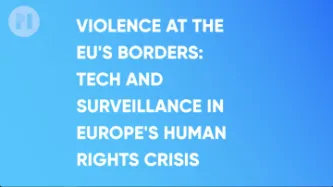Search
Content type: Advocacy
The European Union Artificial Intelligence Act (AI Act) will regulate the development and use of ‘high-risk’ AI, and aims to promote the uptake of ‘trustworthy AI’ whilst protecting the rights of people affected by AI systems.
However, in its original proposal, the EU AI Act does not adequately address and prevent the harms stemming from the use of AI in the migration context. Whilst states and institutions often promote AI in terms of benefits for wider society, for marginalised communities,…
Content type: Press release
The decision by the EU’s oversight body follows a year-long inquiry prompted by complaints outlining how EU bodies and agencies are cooperating with governments around the world to increase their surveillance powers filed by Privacy International, Access Now, the Border Violence Monitoring Network, Homo Digitalis, International Federation for Human Rights (FIDH), and Sea-Watch.The complainants welcome the decision by the European Ombudsman and call on the Commission to urgently review its…
Content type: Long Read
Since early 2021, PI have been investigating and challenging the latest stride in the UK’s cruel migration policies: the roll-out of GPS ankle tags to monitor migrants released on immigration bail, a dehumanising, invasive method of control that monitors and records people’s precise location 24/7.
More recently, we found out through Freedom of Information Requests that the Home Office is working to roll out "smartwatches" - devices that also record 24/7 location data, but instead of being…
Content type: News & Analysis
Privacy International (PI) has today filed complaints with the Information Commissioner (ICO) and Forensic Science Regulator (FSR) against the UK Home Office's use of GPS ankle tags to monitor migrants released on immigration bail. This policy and practice represents a seismic change in the surveillance of migrants in the UK. PI was first alerted to this scheme by organisations such as Bail for Immigration Detainees, an independent charity that exists to challenge immigration detention in the…
Content type: Advocacy
Privacy International (PI) welcomes the call of the Special Rapporteur on the human rights of migrants to assess the human rights impact of current and newly established border management measures with the aim of identifying effective ways to prevent human rights violations at international borders, both on land and at sea.
The issues highlighted in the call for submissions are ones that PI has been investigating, reporting and monitoring as part of our campaigns demanding a human rights…
Content type: Report
Privacy International’s submissions for the Independent Chief Inspector of Borders and Immigration inspection of the Home Office Satellite Tracking Service Programme
The Home Office have introduced 24/7 electronic monitoring and collection of the location data of migrants via GPS ankle tags. This seismic change cannot be overstated. The use of GPS tags and intention to use location data, kept for six years after the tag is removed, in immigration decision-making goes far beyond the mere…
Content type: Video
Links
Josoor International Solidarity’s website is at https://www.josoor.net
No Name Kitchen’s website https://www.nonamekitchen.org
Border Violence Monitoring Network’s Website is at https://www.borderviolence.eu
Their reports documenting violence and trends in Greece and the Balkans route are at https://www.borderviolence.eu/category/monthly-report/
Lighthouse Report’s investigations on pushbacks in the Aegean are available at https://www.lighthousereports.nl/investigation/…
Content type: Press release
Today, the High Court ruled that the Home Secretary acted unlawfully and breached human rights and data protection laws by operating a secret, blanket policy of seizing, retaining and extracting data from the mobile phones of asylum seekers arriving by small boat.
This claim for judicial review was brought by three asylum seeking claimants: HM represented by Gold Jennings, and KA and MH represented by Deighton Pierce Glynn. The Claimants, like thousands of others arriving by small boat, all…
Content type: Explainer
Introduction/Background
Electronic tags have been a key part of criminal justice offender management for over 20 years, being used in the United States since the mid 1980’s and in the UK and some other commonwealth countries since 2003. In 2021 the UK introduced GPS tagging for immigration bail.
The tag is predominantly used to curtail the liberties of individuals. For those on criminal bail its intended use includes managing return into communities while deterring reoffending.
As we explore…
Content type: Long Read
In a roundtable available on YouTube, co-hosted with Garden Court Chambers, Privacy International brought together immigration law practitioners to discuss how they’ve used privacy and data protection law to seek information or redress for their clients.Index:1. UK Border 20252. Super-complaint and judicial review challenge to data sharing3. Mobile phone seizure and extraction4. Freedom of Information Act requestsThe dystopian future: UK Border 2025To set the scene on how the future may look…
Content type: News & Analysis
2022 will see a raft of high tech surveillance tools emerging in the UK government’s arsenal, which will further entrench a ‘hostile environment’ for migrants. Compounding this further, immigration officers will increasingly be using digital forensic tools such as 'mobile phone extraction' under a veil of secrecy. This raises serious concerns about overreach, misuse and abuse of power, the actual quality and integrity of the data they gather, and independent oversight of these powers. But it…
Content type: News & Analysis
On 24 October 2019, the Swedish government submitted a new draft proposal to give its law enforcement broad hacking powers. On 18 November 2019, the Legal Council (“Lagråd”), an advisory body assessing the constitutionality of laws, approved the draft proposal.
Privacy International believes that even where governments conduct hacking in connection with legitimate activities, such as gathering evidence in a criminal investigation, they may struggle to demonstrate that hacking as…
Content type: Advocacy
As any data protection lawyer and privacy activist will attest, there’s nothing like a well-designed and enforced data protection law to keep the totalitarian tendencies of modern Big Brother in check.
While the EU’s data protection rules aren’t perfect, they at least provide some limits over how far EU bodies, governments and corporations can go when they decide to spy on people.
This is something the bloc’s border control agency, Frontex, learned recently after coming up with a plan to…
Content type: News & Analysis
Photo: The European Union
“Border Externalisation”, the transfer of border controls to foreign countries, has in the last few years become the main instrument through which the European Union seeks to stop migratory flows to Europe. Similar to the strategy being implemented under Trump’s administration, it relies on utilising modern technology, training, and equipping authorities in third countries to export the border far beyond its shores.
It is enabled by the adoption…
Content type: News & Analysis
Photo: The European Union
On 2 September 2019, Privacy International, together with 60 other organisations, signed an open letter to the European Parliament to express our deep concern about upcoming EU policy proposals which undermine the EU’s founding values of human rights, peace and disarmament.
Since 2017, the EU has diverted funds towards security research and security capacity-building in countries around the world. The proposal for the EU's next budget (2021-2027) will…
Content type: Examples
A 17-year-old Palestinian resident of Lebanon, Ismail B. Ajjawi, was deported shortly after he arrived at Boston Airport, where he was due to start attending Harvard University the following week.
Immigration officers subjected him to hours of questioning — at one point leaving to search his phone and computer — according to a written statement by Ajjawi. According to the student, his visa was revoked because of content posted by some social media contacts.
The student alleges that…
Content type: Examples
In December 2018, Florida citizen Peter Sean Brown filed a federal lawsuit against the Monroe County Sheriff's offices for arresting and detaining him for three weeks claiming he was an illegal alien from Jamaica. Even though Brown offered to show the sheriff his birth certificate and explained he had been wrongfully detained 20 years before and the jail's own records listed his birthplace as Philadelphia, PA, the sheriff relied on a form sent by Immigration and Customs Enforcement. Brown…
Content type: Examples
In December 2018, in the wake of the Windrush scandal, the National Police Council, which represents police chiefs across England and Wales agreed to cease passing on to deportation authorities information about people suspected of being in the country illegally. The measures also ban officers from checking the police national computer solely to check on immigration status. Police said they believed that their too-close relationship with immigration authorities in aid of the government's "…
Content type: Examples
In a report released in December 2018, the UK's National Audit Office examined the management of information and immigrant casework at the Home Office that led to the refusal of services, detention, and removal of Commonwealth citizens who came to the UK and were granted indefinite leave to remain between 1948 and 1973, the so-called "Windrush generation" but never given documentation to prove their status. The NAO concludes that the Home Office failed to adequately consider its duty of care in…
Content type: Examples
In November 2018 reports emerged that immigrants heading north from Central America to the US border are more and more often ensuring they are accompanied by children because "family units" are known to be less likely to be deported, at least temporarily, and smugglers charge less than half as much when a minor is in the group because their risk is less. Some parents have given their children - sometimes for cash - to other adults such as a relative, godparent, or, sometimes, unrelated person.…
Content type: Examples
In November 2018, researchers at Sweden's University of Lund, the US's Worcester Polytechnic Institute, and the UK's Oxford University announced that in August the US State Department had begun using a software program they had designed that uses AI to find the best match for a refugee's needs, including access to jobs, medical facilities, schools, and nearby migrants who speak the same language. Known as "Annie MOORE", refugees matched by the program were finding jobs within 90 days about a…
Content type: News & Analysis
Privacy International has joined over 30 organisations working with migrants and refugees to write to the newly appointed British Home Secretary to raise a number of pressing issues, which require action if the immigration and asylum system is to regain the trust of the public.
The letter below was sent to the Home Secretary on Wednesday, 30 July 2019.
Find out more about PI’s work to demand a more humane approach to immigration based on the principles of fairness, accessibility, and respect…
Content type: Examples
In 2017, US Immigration & Customs Enforcement (ICE) announced that it would seek to use artificial intelligence to automatically evaluate the probability of a prospective immigrant “becoming a positively contributing member of society.” In a letter to acting Department of Homeland Security Secretary Elaine Duke, a group of 54 concerned computer scientists, engineers, mathematicians, and researchers objected to ICE’s proposal and demanded that ICE abandon this approach because it would be…
Content type: Examples
US Immigrations & Customs Enforcement (ICE) used social media monitoring to track groups and people in New York City associated with public events opposing the Trump administration’s policies, including ones related to immigration and gun control. The investigative branch of ICE created and circulated a spreadsheet, entitled ‘Anti-Trump Protest Spreadsheet 07/31/2018,” that provided details of events planned between July 31, 2018, and August 17, 2018. The spreadsheet pulled data from…
Content type: Examples
The US government created a database of more than 50 journalists and immigrant rights advocates, many of whom were American citizens, associated with the journey of migrants travelling from Central America to the Mexico-US border in late 2018. Officials from Customs and Border Protection (CBP), Immigration and Customs Enforcement (ICE), the US Border Patrol, Homeland Security Investigations, and the Federal Bureau of Investigation (FBI) had access to this database. This list allowed the…
Content type: Examples
A private intelligence company, LookingGlass Cyber Solutions, used social media to monitor more than 600 “Family Separation Day Protests” held across the United States on June 30, 2018, to oppose the Trump administration’s policy family separation policy. The policy was part of a “zero tolerance” approach to deter asylum seekers from coming to the United States by separating children from their parents. After collecting information about these protests through Facebook, including the precise…
Content type: News & Analysis
US Immigration and Customs Enforcement (ICE), the agency at the centre of carrying out President Trump’s “zero tolerance” approach to immigration enforcement and family separation, has for years been contracting a US surveillance company to intercept peoples’ communications across the United States. The wide potential scope for the use of the powers raises concerns about their use for the real-time surveillance of people, families, and communities caught up in Trump’s immigration crackdown…
Content type: Advocacy
Refugees are among the most vulnerable people in the world. From the moment they flee their homes, as they pass through 'temporary' places such as refugee camps and detention centres to their 'final' destinations, they are continuously exposed to threats. In the digital age, these threats are increasingly being driven by the processing of vast amounts of highly sensitive personal data: from enrollment and registration processes needed for them to access services, to their identification and…
Content type: News & Analysis
According to the International Organization for Migration, an estimated 258 million people are international migrants – that is, someone who changes their country of usual residence, That’s one in every 30 people on earth.
These unprecedented movements levels show no sign of slowing down. It is predicted that by 2050, there will be 450 million migrants across the world.
Nowadays, it is politically acceptable to demonise migrants, and countless leaders have spewed divisive and xenophobic…
Content type: Long Read
Cellebrite, a surveillance firm marketing itself as the “global leader in digital intelligence”, is marketing its digital extraction devices at a new target: authorities interrogating people seeking asylum.
Israel-based Cellebrite, a subsidiary of Japan’s Sun Corporation, markets forensic tools which empower authorities to bypass passwords on digital devices, allowing them to download, analyse, and visualise data.
Its products are in wide use across the world: a 2019 marketing…
























